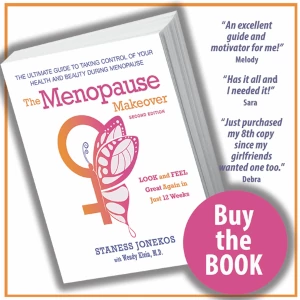 Dear Staness,
Dear Staness,
I am so confused! There is so much conflicting information online about menopause and tests. One website says buy saliva tests to check my hormone levels for $299, and another says these are not good tests and a waste of money. Where do I go for dependable information?
Confused in Connecticut
____________________________________
Dear Confused,
This is a GREAT question! I was shocked at the amount of misinformation online too. The Menopause Makeover co-author Dr. Wendy Klein led me to reliable information sources.
Since menopause is a natural transition, most of us are searching for “natural” management options.
If a website is selling a product, you can bet there will be editorial material supporting their product. How do you know if you can trust what you are reading?
Enter center stage – our leading lady to save the day: science.
The word science comes from the Latin “scientia,” meaning knowledge. Science refers to a system of acquiring knowledge.
Many people associate science with the medical community, and make the assumption that alternative methods are not supported. This is not true.
There are excellent, non-commercial resources supported by science that provide sound information on alternative, complementary and medical menopause treatment options. They are not selling anything. These resources are available to provide you with information supported by scientific research… knowledge based on concerted human effort to understand, or to understand better, the natural world and how the natural world works, with observable evidence as the basis of that understanding.
The North American Menopause Society is a professional, non-profit organization. To find your answer about hormone saliva testing, go to The North American Menopause Society and enter “hormone testing.”
“Saliva testing to determine if a woman has the “right amount” of hormones has not been proven accurate or reliable. Even blood testing of hormone levels has the drawback that levels vary throughout the day as well as from day to day. More important, the desired levels in postmenopausal women have not been established. In addition, an individual woman’s physical comfort may not even be related to her absolute hormone levels.”
On any website, it is wise to read the “About Us” link so you know WHO is providing the information. Generally, non-commercial websites make that information readily available so you can see the credentials and expertise of the people who are providing your advice.
We are all different. Work closely with your healthcare provider to discuss menopause treatment options specific to you.
Dr. Klein says, “Know where your medical health information is coming from, and don’t trust the biased medical information on websites that are selling products.”
I applaud your efforts to get educated on menopause matters. Gather information from reliable sources. My favorites are listed below.
Staness
Reliable resources that are unbiased and supported by science
North American Menopause Society
The National Library of Medicine
MedlinePlus
















